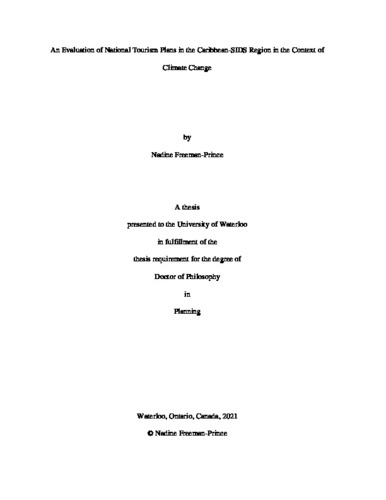| dc.description.abstract | The Caribbean-Small Island Developing States (SIDS) region is heavily reliant on its tourism sector which is amongst the most vulnerable to climate change impacts globally. Sector officials and regional governments have acknowledged that the impacts of climate change will have serious implications on tourism and by extension, the region’s development. This is because tourism is positioned as an essential element of these nations’ development strategies and their prospects of achieving the United Nations Sustainable Development Goals (SDG) 2030 Agenda. Substantial financial and technical resources have been used to develop the region’s national tourism plans, which are the main policy instruments that guide tourism development and planning in the region. However, it is unclear whether the strategies contained in these plans have been effective in achieving appropriate climate change responses.
It is within this context that I posed the overarching research question: “Is the tourism sector in Caribbean-SIDS ready to deal with the projected impacts of climate change?” This dissertation used a novel approach - the Tourism-Climate Change Plan Quality (TCCPQ) framework to explore the readiness of the region’s tourism sector to the projected climate change impacts. This framework consisted of a protocol which comprised eight core plan quality principles and fifty-six criteria and used content analysis to assess the quality of thirteen of the region’s publicly available national tourism plans in the context of climate change.
The research revealed that there is evidence of the integration of climate change actions in the region’s national tourism plans. However, there are opportunities to enhance the capacity across the region to aid in improving the quality of plans in articulating their fact base, goals, implementation, and monitoring and evaluation as these were found to be weak areas.
The research also captured the perceptions of tourism, climate change, and planning stakeholders in the region, to determine the priority areas for climate change responses in the tourism sector. Recommendations are provided for improving the quality of the plans and to assist the region in enhancing its tourism sector’s capacity to plan for and manage anticipated climate change impacts. The study offers some valuable contributions for theory, practice, and research design. | en |

